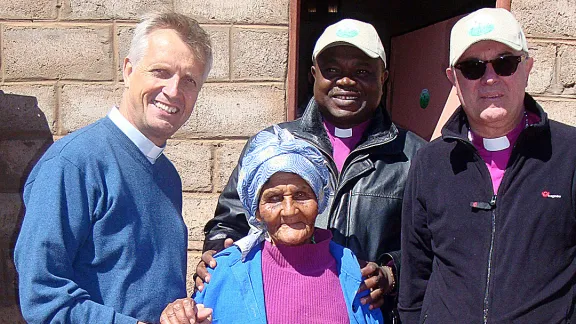
Rev. Martin Junge, Presiding Bishop Dr Alex G. Malasusa and Bishop Dr Frank O. July visit a parishioner in southern Namibia. Photo: LWF/Klaus Rieth
Visiting LWF Delegation Assesses Impact of Prolonged Dry Spell on Rural Communities
(LWI) – Leading a delegation of The Lutheran World Federation (LWF) to drought-affected regions in Namibia, General Secretary Rev. Martin Junge has underlined the Lutheran communion’s solidarity with communities struggling to deal with a disaster that has decimated grazing pastures, food crops and water sources.
“We are churches that live with people and look after people,” Junge told Chief Hansen and other leaders of the Amperbo community in Hardap region, southern Namibia on 21 September. “We want to be the neighbors of those who suffer. As Christians we have received bread and wine from our Lord as signs of reconciliation and as food for body and soul. And we want to pass that on,” he added
The LWF delegation visiting Namibia, 19-24 September, to assess the drought impact and affirm support for the response coordinated by the three LWF member churches there included Presiding Bishop Dr Alex G. Malasusa (The Evangelical Lutheran Church in Tanzania); Bishop Dr Frank O. July (the Evangelical Lutheran Church in Württemberg); Ms Colleen Cunningham (The Moravian Church in South Africa); Rev. Eberhard Hitzler, director of the LWF Department for World Service, and Rev. Dr Elieshi Mungure, area secretary for Africa at the Department for Mission and Development.
“We will assist you as long as is necessary in these difficult times,” Junge promised, saying the Lutheran communion would continue to provide further support to the suffering population. He said it was good to see that ecumenical cooperation in Amperbo village was such a natural thing, noting for example that the Lutheran delegation was also welcomed by Roman Catholic deacon Thomas Kühelwind, who likewise expressed his gratitude for the assistance provided.
More than 800,000 Namibians are affected by the worst drought in the country in more than 25 years, and they require urgent assistance. In an LWF drought-response partnership with the Evangelical Lutheran Church in the Republic of Namibia; the Evangelical Lutheran Church in Namibia and Evangelical Lutheran Church in Namibia (GELC), households affected by the calamity are receiving cash to cover their basic food and other needs. They will also get psychosocial support; gain knowledge about resilience in responding to future disasters, as well as capacity to advocate for their rights.
The cash payout of Namibian dollars 100 (approximately USD 10) per head which started in September will benefit around 4, 800 people in Hardap, Kunene, Omusati and Kavango regions. The LWF team in Namibia, working together with the three Lutheran churches, has signed an agreement with The Namibian Post, a national service provider that will assist in the cash relief program using debit cards. In the first phase, USD 150,000 will be distributed to the most vulnerable segments of the communities affected by the drought.
During the visit to Amperbo village, Hitzler pointed out that after World War II, Namibia had helped Germans with dried fish, grain and flour. That was despite the fact that the Germans had inflicted great suffering on the country through colonialism. “Today we are the ones to be able to help and tomorrow it will perhaps be your turn again in Namibia!”
Conflicts over Scarce Resources
Chief Hansen explained to the LWF delegation that there were more and more conflicts with the surrounding villages over scarce grass for the animals due to the drought.
He thanked the Lutheran communion for its assistance, asserting that God had led the LWF to his village “The great drought has knocked us out for months. I didn’t know how I was going to look after my people. We have places here where there is grass and no water and, vice versa, there are places where there is enough water but no grass for the cattle, sheep and goats.”
(Written for LWI by Klaus Rieth, Evangelical Lutheran Church in Württemberg, Germany, who accompanied the LWF delegation to Namibia)


